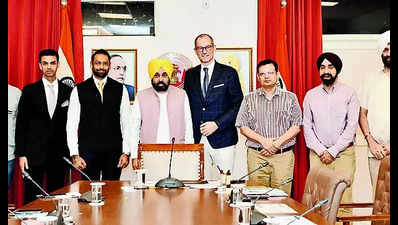MUNICH: Singapore firms have been making greater strides in Europe - especially Germany - with both nations sharing several economic ties. Among these companies is Accuron Technologies, which expanded into Europe by acquiring a German firm that manufactures semiconductor equipment. The move has diversified the product offerings of the firm, which has subsidiaries involved in fields like aerospace, automotive and industrial automation and technologies.
Merger and acquisition is an important strategy that the company uses, as it provides access to markets, skills and customers quickly, said its CEO Tan Kai Hoe. “This is particularly important in certain areas where the entry barriers could be quite high, and without merger and acquisition, it can take you a much longer time, if you even succeed at all, to enter into this,” he told CNA in Munich. Another firm, Armstrong, which makes film and foam products that insulate noise, vibration and heat, built its brand in Germany.

Under a joint venture with a German firm, it was introduced to luxury car brands which helped it expand to new markets. Labour laws and culture differ from country to country, noted group CEO Phyllis Ong. “We don't know the local operations.
So I think this way, it allows the local partners to flourish, and then it allows us to focus on our territories and geographies,” she said. SPIKE IN COUNTRIES EXPLORING EUROPE Enterprise Singapore, which champions internationalisation, said it has seen a spike in companies exploring opportunities in Europe post-pandemic. In 2023, EnterpriseSG supported 220 companies to explore a wide range of markets in Europe, including Belgium, France and Germany.
This was 20 per cent higher than in 2022, and almost 50 per cent more than that in 2019, pre-COVID-19. German firms, in particular, are keen to partner, or tap merger and acquisition opportunities with Singapore firms, said Mr Alan Yeo, director of Europe at EnterpriseSG. Many small- and medium-size enterprises (SMEs) in Germany, have faced challenges in growing due to the limited size and market size in Germany, and want to venture out, but they have limited opportunities, he said.
They also find succession planning for their particularly niche and technology-based businesses difficult, he added. “They are looking for partners who can help them to grow in terms of different markets, especially in Southeast Asia or Asia regions and (some of them) are also very open to merger and acquisition opportunities and joint ventures,” he said. GROWING TECH PARTNERS With Singapore and Germany sharing many economic priority areas, there continues to be room for start-ups to tap opportunities.
Under an initiative called the Global Innovation Programme, EnterpriseSG is looking to grow more partners in the tech sector. Firms like TeleMedC, which uses what may pass off as a routine eye check to detect diseases like diabetes, have benefitted from the programme. In 2021, the firm wanted to bring its artificial intelligence software out of Asia in 2021, and crack into the European market through Germany.
However, success was out of sight initially. Language was a big barrier, said the firm’s CEO Para Segaram. “None of us spoke German, so it was very difficult going to a country where you don't even know the language.
The entire business conduct is all in German, so it's pretty challenging,” he said. He added that the firm also did not know how to enter the German market. Through the programme, he was able to link up with other stakeholders.
EnterpriseSG appoints a network of partners to accelerate firms’ journeys by familiarising them with a market, helping them strategise and building connections, said its assistant managing director of innovation Emily Liew. “We will connect them to investors, reference customers or other co-innovators, if you know they need to improve their product for the market further,” she said. GROWTH GOES TWO WAYS Since 2019, EnterpriseSG has helped more than 500 Singaporean tech companies enter the European market.
Those that have undergone the programme have seen a compound annual growth rate of 43 per cent from 2020 to 2022. The benefits go both ways. German companies also receive help to gain a footing in Singapore through Start2 Group, EnterpriseSG’s acceleration programme partner in Munich and Berlin.
Start2 Group’s global CEO Claus J Kathe said Singapore is an entry point for the rest of the region. The key aspect is that you have huge markets around. You have Indonesia, you have the Philippines, you have Thailand, Malaysia and so on,” he noted.
“We always try to bring startups to more than one market, so they can basically scan the possibility and understand which of these markets is their best.” German start-ups said the programme has helped them expand their network, giving them opportunities to work with even big players. For example, IT solutions company Tiramizoo clinched a project with Singapore’s Government Technology Agency (GovTech).
Its CEO Martin Straeb said such opportunities could open up the possibility of linking up with a partner to open businesses in Singapore..


















